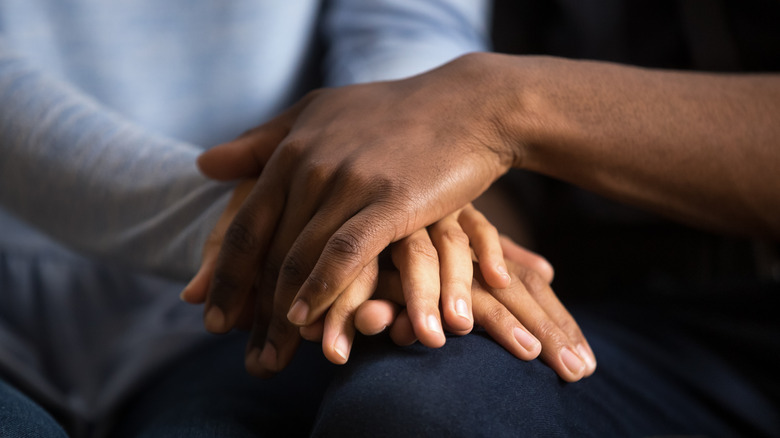What Not To Say To Someone Who Suffered A Miscarriage
The following article discusses pregnancy loss and grief.
When a loved one is grieving, it can sometimes be difficult to find the right words to show your support. That is especially true for those who experience a miscarriage. People often say the wrong things, even unknowingly, because pregnancy loss is not often discussed openly. As uncommon as it may be to talk about, it is a very common experience. According to March of Dimes, up to 15% of pregnancies result in a miscarriage. MedlinePlus defines a miscarriage as a "spontaneous loss of a fetus before the 20th week of pregnancy." A miscarriage is a naturally occurring event and can happen even before a woman knows she's pregnant. For some, medical intervention may be needed when a pregnancy is found to be nonviable, via ConceiveAbilities. Whether a miscarriage occurred naturally, unknowingly, or with medical assistance, it can be devastating for those who experience it.
Many people who have a miscarriage are riddled with guilt and shame. Some even feel they are not valid in their grief because they never met their baby. While they may experience this guilt and pain, it is important to understand that most miscarriages happen spontaneously during development, at no fault of the parents, per Mayo Clinic. If your loved one has experienced a miscarriage, you might feel the urge to say something to comfort them and ease their pain. However, there is a right and a wrong way to approach their pregnancy loss.
Normalizing miscarriages can help those who are grieving
Even though miscarriages are extremely common, it is often spoken about in whispers, if at all. According to the World Health Organization, "Many women report that no matter their culture, education or upbringing, their friends and family do not want to talk about their loss." This silence can often lead to a stigmatized view on pregnancy loss, causing those who experience a miscarriage to feel alone as they process grief. Clinical psychologist Jessica Zucker discussed the trauma she endured after her own miscarriage. Per the World Health Organization, she said "After my miscarriage, I poured over the research which shows that a majority of women report experiencing feelings of shame, self-blame and guilt following pregnancy loss." Even people with supportive partners and families who mourn with them have trouble relating to the physical and mental toll losing a pregnancy causes.
Kimberly Van Der Beek and her husband, actor James Van Der Beek, spoke openly about her three miscarriages in hopes of normalizing the experience and encouraging healthy conversations that break the stigma surrounding pregnancy loss. Van Der Beek told the World Health Organization that "even in the best of circumstances, I was devastated every single time ... The stigma and trauma result in a lack of conversation about miscarriages and people are often left feeling alone, confused, and worst of all — to blame." When comforting someone who has recently had a miscarriage, encourage them to share openly and listen with compassion.
Try not to make these kinds of comments
While comments like "everything happens for a reason" or "it's for the best" may be well-intentioned, they may not be well-received by those who have just miscarried. Dr. Robin Elise Weiss discusses examples of these harmful comments in VeryWell Family. She says that comments such as, "You can always try for another," "You're so young, it will happen next time," or any iteration of encouraging the next pregnancy belittles the grief the parents feel over their current loss. Comments that begin with "At least" are almost always not helpful: Saying things like "At least it happened early," or "At least you didn't know the baby," can diminish your loved one's experience, while saying "at least you know you can get pregnant," can bring up anxieties about the next possible pregnancy as they are processing the loss of this one.
Dr. Jessica Zucker told Motherly that it is important not to rush people in their grief and avoid projecting your own feelings about their loss onto them. It's generally a good idea to avoid comments like, "It's all in God's plan," unless you know for certain that the person suffering a loss is spiritual and would find comfort in that type of condolence. Even if you would find comfort in that knowledge, your loved one's grief is personal to them and their experience. These types of comments may also unintentionally justify the loss, which can be devastating to receive.
Remind your loved one that they are not alone
For many who have a miscarriage, they are not only grieving the loss of their fetus, but the loss of the future they had envisioned as they experienced pregnancy. Choose your words carefully and approach your loved one with compassion. Dr. Jessica Zucker recommends keeping it simple and saying "I'm sorry for your loss. I am here for you," per Motherly. Empathize with the bereaved by expressing your love for them, and remind them to be gentle and patient with themselves as they heal. Sending flowers or a gift is a thoughtful way to show you are thinking of them, per Tommy's. Miscarriages affect people physically and mentally, so try offering to help with chores or errands. Always ask before you do something for them, because even the kindest gesture may not be what they need.
Dr. Zucker recommends asking yourself, "What would I want in this situation?" While nothing you say can change their situation, it is important for them to know they have a support system. Grief has no set timeline, so be patient as your loved one navigates their grief.
If you or someone you know is struggling with mental health due to a miscarriage, you can also contact the Crisis Text Line by texting HOME to 741741, call the National Alliance on Mental Illness helpline at 1-800-950-NAMI (6264), or visit the National Institute of Mental Health website.



